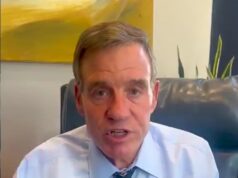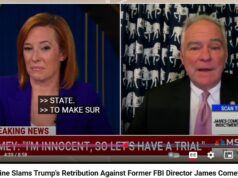A bit earlier today, the Center for American Progress (CAP) held a panel discussion – see video, below – entitled, “Virginia’s Newly Elected Progressive Prosecutors.” The panel featured Parisa Dehghani-Tafti (Commonwealth’s Attorney-elect, Arlington County & City of Falls Church); Steve Descano (Commonwealth’s Attorney-elect, Fairfax County); and Buta Biberaj (Commonwealth’s Attorney-elect, Loudoun County) – all elected in 2019 by voters who, as CAP puts it, “made it clear that their prosecutors must have a definitive commitment to criminal justice reform.” Among the highlights of what Descano, Tafti and Biberaj said in this VERY interesting discussion were:
- Descano said he ran because, as a prosecutor, he saw “disparities” in the system – “based on the color of someone’s skin, their background, what their education was, where they lived, how much money they had – and that bothered me significantly.”
- Tafti said she decided to run because of her determination to change “inequities” in the criminal justice system and what she refers to as a “mass incarceration machine set on autopilot.”
- Biberaj said she saw “huge disparities in the system” and a feeling that the system could be too “check the box” and not doing enough to ask, “what is the impact to our community?” Biberaj said the 2016 election of Trump was “very devastating,” that she was feeling somewhat “helpless,” and in thinking what she could do, decided that she would try to change things for the better at the local level.
- In terms of obstacles to getting elected, Descano argued that many voters don’t really know what a Commonwealth Attorney does or don’t care about it.
- Tafti said the main challenge she faced running for Commonwealth’s Attorney was the “growing narrative in pretty extreme circles that trying to reimagine the criminal-legal system is somehow going to make us less safe…somehow disrespects victims…[and] law enforcement.” Tafti argued that “prosecutors had plenty of discretion when they were white men trying to make the system more harsh,” but “now that we’re getting prosecutors who want to talk about reform…and now that the face of prosecutors is different…all of a sudden, prosecutorial discretion is very very bad and prosecutors…shouldn’t have discretion…as soon as women of color and as soon as people trying to reimagine the mass-incarceration machine…show up, that suddenly now, well discretion is not a good thing, [prosecutorial] discretion is dangerous.”
- Biberaj said “we need to change the culture within the criminal justice system” to “do justice,” not just to “punish to the full extent of the law.” According to Biberaj, “safety and justice are not opposite statements or opposite goals; safety equals justice.” Biberaj also talked about the importance of moving the criminal justice system from a “failure-oriented system” to a “success-oriented system.”
- On the local press covering criminal justice issues, Biberaj said “we didn’t get a lot of coverage out in Loudoun County…[Arlington and Fairfax] had the greater battle” and a lot more coverage. Descano said his race “got a lot of press…from a number of different outlets” and what he saw was a “wide range of reaction to what I was trying to do,” with most falling “in between the two extremes” of people who “got it” and others who “no matter what I said, their view…was that everything that we were trying to do was disrespectful to victims or law enforcement.” Descano said that coverage got better over time as he got his message out and it became “a boon to our campaign.” Tafti said that “nobody was looking at any data in terms of news outlets,” that “being so close to DC and the national news…helped in the sense of getting the message out really widely.” Tafti also mentioned the importance of media getting the subtleties of candidates’ positions out there, really delving into the issues…
- Biberaj said there are people out there who “don’t quite buy into what we’er trying to do…they’re just waiting for a screw-up,” and that progressive prosecutors need to “continue the education part of it” and have “a support system in place…get[ting] the right players on my team.” Tafti said she has plans to collect data and really “show her work,” not “govern by anecdote.” Tafti also talked about the importance of getting “the right team in place.” Descano said he’s going to follow his 20-page white paper as a “touchstone in the office,” a “foundational document.” Descano said he’s “remade my entire leadership team…with great attorneys…who share the vision that we’re trying to bring to this office.” Right now, Descano said, the Fairfax County Commonwealth’s Attorney’s office has “no written policies,” which he said is a fact that “might shock you.”
- In terms of institutionalizing changes, Tafti said “we need Richmond and we need to make these changes on a statewide level; I’m talking about discovery…not trying kids as adults, getting rid of mandatory minimums,” etc., so she will “lobby and testify and advocate for the changes [she supports]…on a statewide basis.” Descano said that legislators “listen to their Commonwealth’s Attorney” but “haven’t had a partner in these important offices to have a conversation with.” Descano noted that in the the Virginia Association of Commonwealth’s Attorneys (VACA), each Commonwealth’s Attorney gets one vote regardless of population, which means that Descano, Tafti and Biberaj represent around 25% of Virginia’s population but only have three votes out of 120. Descano pledged to push VACA – and the legislature – towards more progressive positions on criminal justice. Tafti added that it’s “disingenuous” to argue that Commonwealth’s Attorneys “don’t have a role in policy” or in “shap[ing] the law,” and simply have to “blindly follow.”
- All three discussed immigration reform, for instance how it’s important for the community at large for immigrants to feel safe to come forward and report crimes. Tafti emphasized that she represents “the entirety of the community” and it’s important for the community to know “they will be safe if they report a crime…if they’ve been a witness to a crime and they don’t have to worry about their status in terms of whether or not they’re documented.” Tafti said she will have a policy of taking into account “collateral consequences,” such as whether an immigrant might be shut out of the job market or become deportable.
- Descano argued that “paying prosecutors offices and funding them based on their felony charges…completely incentivizes more felonies” and “could have a chilling effect in other jurisdictions.” Tafti agreed that there’s a “very perverse incentive structure upon which we get our funding” and argued “we need different metrics.” Biberaj said we need to address mandatory minimums and share with the jury what the true costs are of incarcerating someone.













